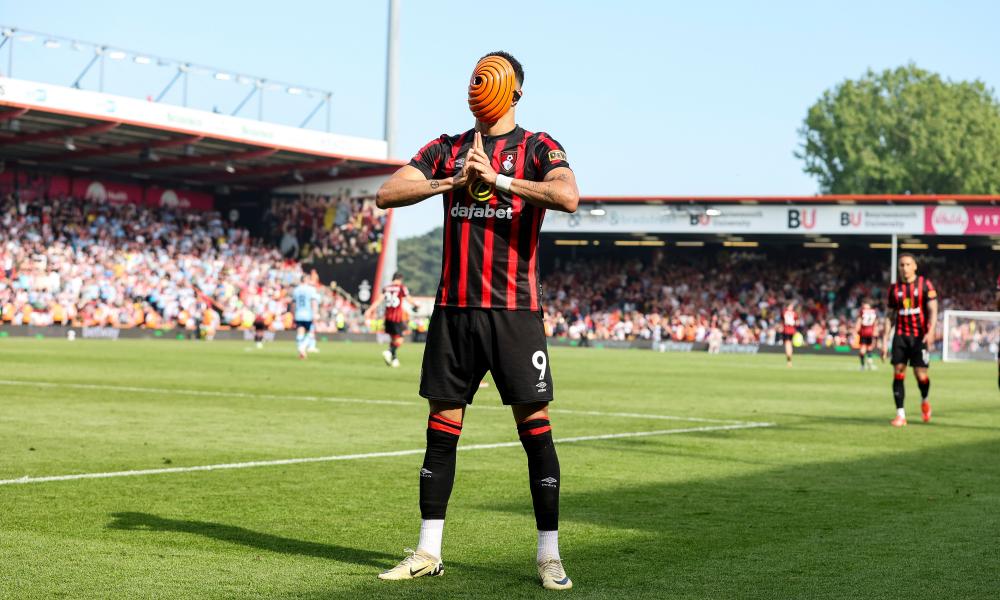
‘QUITTING IS THE DEVIL’S FRUIT!’: WHY ANIME IS FIRING UP SPORTS STARS
The Bournemouth striker Dominic Solanke twice thought he had scored the opening goal against Brentford on 11 May. Each time he wheeled away to celebrate, he put on an orange mask with a spiral pattern and one eyehole before posing in front of the cameras.
The goal was ruled out by VAR but the celebration went viral, as journalists wrote about “masked mayhem” and others wondered what this “bizarre” celebration could mean.
It was the latest in a string of hand gestures and poses that Solanke has struck this season which are inscrutable for the uninitiated but for fans of anime – Japanese animated dramas – it’s obvious the mask was a character, Obito Uchiha, from the Naruto series.
With its roots in 80s manga comics and animated films such as the 1988 cyberpunk epic Akira, anime has transcended its Japanese base and become a worldwide phenomenon in the past two decades. It has grown from children’s entertainment to a medium for any kind of story, covering every genre from historical to sci-fi and romance to humour.
Shows including Dragon Ball Z, One Piece and Naruto have stretched to hundreds of episodes and are watched by millions on streaming platforms, with the whole industry – including comics, video games, merchandise, TV shows and film – worth about $30bn (£24bn) in 2023.
Shonen, a form of anime primarily aimed at 13- to 18-year-old boys has proved particularly popular with the current generation of sports professionals.
So far this season, Solanke, who has had a breakout year scoring 19 goals, has made subtle references to shonen during his celebrations, including Jujutsu Kaisen, Gear Second and One Piece.
The Bournemouth striker isn’t alone in his anime goal celebrations: NFL stars, footballers in the Bundesliga, Olympic athletes and rugby league players in Australia’s National Rugby League have all embraced the trend.
The MMA star and former UFC middleweight champion Israel Adesanya has arguably done more than any other sports person to raise the profile of anime. The Nigerian-born fighter often picks a different anime theme for his bouts: changing his ring walk, music and sometimes fighting style in honour of a particular show he likes.
When Adesanya fought the Brazilian Anderson Silva in 2019, he posed with his arms stretched out in reference to another Naruto character, Rock Lee. “If you know, you know,” he has said about the gestures. “I play to my crowd.”
Many of the sports people embracing the trend are gen Z, those born between 1997 and 2012, although some, such as Adesanya, are older millennials.
Helen McCarthy, an anime expert and author, said the fact more gen Z are referencing the genre makes sense as they were children when two key changes happened that triggered its boom: the popularisation of high-speed internet, which 50% of UK homes had by 2009, and the proliferation of anime pirating platforms.
“Until that happened, we couldn’t access anime on a regular basis,” said McCarthy. Gen Z now has access to anime on the same level as everything else they stream.”
Isaac John, the former professional rugby league player who now runs the podcasting and clothing company YKTR, says many Australian and New Zealand players grew up with shows such as Dragon Ball Z, watching it after school.
“It’s that little pocket of one hour in a day between school and chores that you can get some escapism,” he said. “Footy players are just big kids, they never really grow up.”
But for some sports figures, anime isn’t just culture they enjoy consuming during downtime, it’s also inspirational. Asked if anime has influenced his style of play, Solanke told the BBC: “You could say mindset a bit because it’s just so, like, relentless, so many stories [about] the characters just not giving up. It’s actually always nice to think back to those characters and what they have gone through and how hard they worked.”
That idea of resilience and resolve is something several sports people have said fuels their love of the animated dramas.
In Australia, the rugby league player Brian To’o of the Penrith Panthers has started a clothing brand with his teammate Jarome Luai, inspired by Dragon Ball Z, and To’o said he models himself partly on the character of Son Goku.
“He’s a family man who strives for greatness, and that’s something that inspires me,” To’o said last year before the State of Origin series, where he appeared in Dragon Ball Z-inspired boots.
“In my world, I’m player one,” Adesanya recently told GQ, when explaining his nickname “the Last Stylebender”, a reference to the Avatar anime. “I had to master all the elements of martial arts to realise my destiny … It’s very relatable.”
2024-05-24T14:20:40Z dg43tfdfdgfd